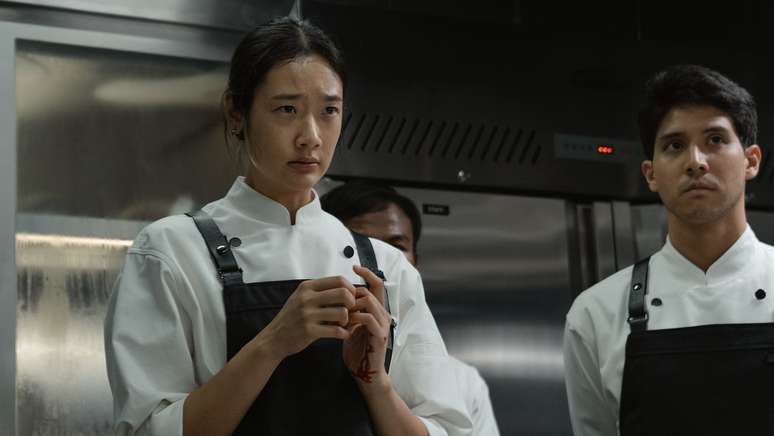The Thai film, Hunger for Success, comes to Netflix with a major social critique, even if it glorifies poverty a bit; read our review
Demonstrating that he is determined to invest in Asian productions, leaving the Europe-America axis a little, Netflix released his new Thai drama. Authorized Hunger for successthe film even resembles the acclaimed The menu in some moments, but abuses the drama to distance itself from the feature film and ends up weaving a good social critique, even if a bit biased.
To begin with, the story accompanies Aoy, a young woman who works in the family café and whose professional life is not very important. One day she receives a note inviting her to audition at Hunger, Chef Paul’s famous restaurant. A little suspicious, the young woman accepts the invitation and soon joins the team. But what seemed like a dream quickly turns into a nightmare when the famous cook arrives on the scene dressed in arrogance and bad temper.
From then on, what we see is a succession of shouts and orders, and crestfallen employees trying to somehow distinguish themselves in the famous chef’s kitchen. With good food scenes and an interesting plot at the beginning, the film manages to capture the attention of the viewer, and the first hour and a half of the screen passes quickly without major problems.
The main dish: a man destroyed by his own arrogance
From the second half onwards, Aoy quits the famous restaurant for disagreeing with the boss’s attitude and starts working in another successful establishment. From that moment on, the two fight a kind of war, where the protagonist is only interested in being able to do her job well and the boss Paul still wants to destroy her.
Through simple but well-structured dialogues, Hunger for success justifies this arrogance on the part of the master with a fundamental premise: the dream of the oppressed is to become the oppressor. For having been a poor child, the son of a maid and having grown up watching the master’s son eat the best, Paul promised himself that one day he would have access to all this too. And when he finally gets what he wants, he becomes a notorious egomaniac who cares neither about the food he cooks nor about the people who eat it.
When you have more than enough to eat, your hunger won’t go away!
One of the most elaborated points in the film’s social criticism is that those who don’t have to worry about money and, consequently, about hunger, don’t necessarily worry about what they eat, but rather about reinforcing a message of superiority towards the lower classes. .
In the party scene, one of the best in the film, Aoy and Paul go head-to-head to see who can best entertain the wealthy locals. While the young cook’s food is all about simplicity and tradition, the chef puts on a grotesque and bizarre show by cutting up a huge piece of meat and cooking it right there in front of everyone.
The rich, amazed by what they are seeing, rally around Paul, cheering him on once again, but as soon as his image is destroyed by an internet video, everyone turns against him, proving that appearances really matter. .
Social criticism and the glorification of poverty
Following this line, Hunger for success manages to make a social critique by addressing the main points of the rich report against poor, and leading to an important reflection: why can only those with money have access to a quality meal? Why can’t the poor eat well?
At various points in the film, it’s easy to forget that the plot is weaving a portrait of Thailand and think it’s talking about Brazil, or Venezuela, or Cuba, or any other country where social inequality is evident.
Despite this, there is a question in the text that bothers. After becoming a successful boss thanks to her work, Aoy is questioned by everyone around her: her family, friends and even Paul blame her for her success.
Therefore, the message remains that growing up in life, even honestly, is evidence of bad nature or error. After having managed to extricate herself from an abusive professional relationship and having filled a restaurant by herself, the protagonist abandons her entire career to return to the bar of her beginnings: that of her family.
Thus, once again poor and in difficulty, she obtains the redemption expected by all, but there is a glamor of poverty which irritates and makes it seem that the place of the poor is the same: in misery.
Is Hunger for Success worth watching?
Netflix’s new Thai film pleases on many points, especially in terms of pacing: it’s not slow to make you sleepy and it’s in no hurry to screw up the script. The interpretations are also good, especially the protagonist played by Chutimon Chuengcharoensukying.
The annoyance lies precisely in the bias of criticism, which somehow strengthens the oppressive system of social inequality. Even so, it’s worth giving it a chance, especially since it’s an Asian production, which, although it has gained prominence in Brazil, is still little seen by us.
Anyone who wants to watch and draw their own conclusions can now hit play Hunger for success TO Netflix.
Trending on Canaltech:
- 5 reasons NOT to buy the New Chevrolet Montana
- Income Tax 2023: see when the refund is triggered
- Which Samsung phones will have Galaxy S23 camera features?
- PS5 Q-Lite: Sony’s portable console wins alleged price and release date
- The blood test can detect more than 50 types of cancer
- What are the benefits of direct currency conversion between Brazil and China?
Source: Terra
Rose James is a Gossipify movie and series reviewer known for her in-depth analysis and unique perspective on the latest releases. With a background in film studies, she provides engaging and informative reviews, and keeps readers up to date with industry trends and emerging talents.


![It All Begins Here: What’s in store for Tuesday 28 October 2025 Episode 1294 [SPOILERS] It All Begins Here: What’s in store for Tuesday 28 October 2025 Episode 1294 [SPOILERS]](https://fr.web.img5.acsta.net/img/14/73/14737ec10a5b71ce2d84fc54b311117f.jpg)



